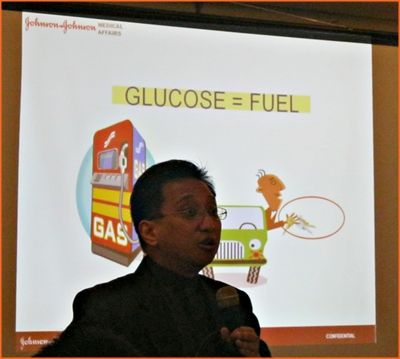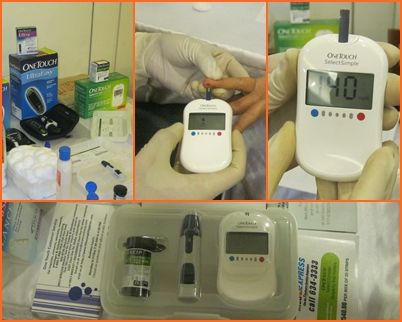When diabetes is mentioned, sugar is more likely the word that comes to mind. We’ve all heard about sugar-free diet for those who have diabetes and we’ve heard several say that didn’t want to eat too much sugar lest they acquire diabetes. However, sugar in the form of glucose is an important part of our diet, whether you have diabetes or not. It can sometimes be hard dieting with diabetes, so it is definitely worth reading up on what you should and shouldn’t be doing. You’ll want to know what can cause diabetes, you’ll also probably want to know what diabetes can cause. For example, it might be the reason that you have an overactive bladder. If this is the case then it might be a good idea to check out something like this Advanced Urology centre to see if they can help you with your problem.

Dr. John Flores, Medical Director of Johnson & Johnson ASEAN, shed light on the many misconceptions about diabetes and increased our awareness of diabetes during the Diabetes Awareness Dinner Forum held on May 26, 2012. Understanding that many are not familiar with medical terms, Dr. John Flores explained the causes and types of diabetes in a manner that we all could relate to. Now, bear with me as I try to share with you what I have learned from him about diabetes and how to properly manage it.
GLUCOSE in the blood is needed by the cells to provide energy.
It is the FUEL that sustains cellular activity necessary for our body to function.
That means we need glucose and should not remove it entirely from our diet. So, if sugar isn’t the culprit for diabetes, what is? Well, another term that is closely associated with diabetes is Insulin.
If glucose is the fuel, then INSULIN is the KEY needed for glucose to enter the body’s cells.
No, insulin is not the culprit. But the lack of insulin and our body’s resistance to it are the primary causes of diabetes. Without insulin, glucose is unable to enter the body’s tissues and this causes the tissues to use up their energy reserves.
So a person with diabetes has high blood sugar either because his body does not produce enough insulin or does not respond to the insulin produced. The different causes are used to classify diabetes into several types where three of the main types are:
Type 1 DM (Diabetes Mellitus), Type 2 DM, Gestational Diabetes
Type 1 DM results from one’s inability to produce insulin, Type 2 DM is caused by insulin resistance, and Gestational Diabetes is when women experience high sugar levels during pregnancy.
While there are no definite triggers that cause such abnormalities in our insulin, a number of risk factors can make our body prone to insulin breakdown or resistance. These factors include: stress, old age, obesity, medication, pregnancy, surgery and sedentary lifestyle.
Type 2 DM (Diabetes Mellitus) cases have been steadily increasing in the past couple of years. This is because most people have poor lifestyle habits that are surefire recipes for acquiring diabetes. There are also genetic factors that contribute to the development of diabetes in a person but unless this is a juvenile or inborn condition, there are still measures that we can take to prevent this illness.
First is for us to be aware of the dangers of this illness and be on the lookout for possible symptoms and regular monitoring of our sugar levels. Irregularities in blood sugar levels, hyperglycemia or hypoglycemia, may be experienced by individuals in certain situations whether they have diabetes or not. So, how would you know if you have diabetes? The only way you can be certain is through laboratory tests and these critical numbers:
126 – 8 – 2
200 – 2 – 75
The first set of numbers means that you have diabetes if you have 126 mg/dl of glucose after 8 hours of fasting in 2 separate occasions. The second set means a result of 200 mg/dl of glucose after 2 hours of consuming 75 grams of glucose also indicates diabetes. The normal fasting glucose is 70-100mg/dl, so if your test results are anywhere between this range, you have nothing to worry about.
What if test results do indicate that you have diabetes? Though this is something that you have to bear with for the rest of your life, be glad that this disease is quite manageable now with proper medication and a healthy lifestyle. Dr. John Flores shared five things a diabetic patient needs to do to cope with diabetes:
Medical Nutrition Therapy
Exercise
Patient Education
Drugs/Medications
Optimization of Glucose Level Through SMBG
A person with diabetes would be smart to Achieve Blood Glucose Control, Blood Pressure Control, and Cholesterol Control. It is important for him to be able to monitor his blood glucose sample with diabetic testing supplies as this is one of the cornerstones of diabetes management. It is therefore important to choose the right monitor that is both accurate and precise. A home blood glucose meter should have a CV(coefficient of variation) of less than 5%.

During the event, our sugar levels were taken using One Touch meters which gave results in just a few seconds. Meters such as these are essential for those who have diabetes as Self-Monitoring of Blood Glucose (SMBG) can help guide therapy towards optimized glucose control.
Thanks for the info sis, we don’t have this case in our family, I hope wala talaga.. 🙂
Diabetes is really one tricky condition. You got to do a perfect balancing act. That’s why you really have to monitor all those vitals. Being caught by surprise is not a good option as complications are plenty.
I’m sure it’s very difficult to have diabetes. If it’s in the genes, there’s very little that one can do, but still, a healthy lifestyle will also help a lot.
Geez… good that we don’t have it in our genes but we can still acquire it naman if we don’t take care of our health. -_- I have to watch out for my sugar level kasi ang hilig hilig ko sa matatamis and konti ang intake ko ng water… Hmm really thanks for this post.. It’s very informative po..
I was recently diagnosed with type 2 and was adviced by my dietician to strictly make adgustments to my dietary habits.I have been following her guidelines and since then have brought my sugar levels under normal range.Eating a balanced diet with reduced portions of carbs and walking for 30 minutes daily,will help in bringing the sugar levels under control.
I’ll keep this in mind. I haven’t been diagnosed yet (and hopefully, never) but most of my relatives have diabetes. I have to start cutting down on carbs and walking daily so I can keep it at bay.